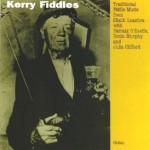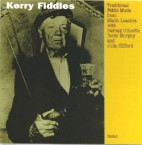- Polkas: The Top of the Maol/ The Humours of Ballydesmond
- The Fisherman's HP/ Byrne's Hornpipe
- Muckross Abbey/ Mulvihill's. Reels
- Cronin's HP/ The Stack of Barley.
- O'Donnell's Lament
- Danny Ab's Slides
- The Frieze Breeches/ Paudeen O'Rafferty
- Chase Me Charlie/ Tom Billy's Slides
- Kennedy's Favourite/ The Woman of the House
- Apples in Winter/Maids on the Green/The Thrush in the Straw
- The Old Man Rocking the Cradle. Air
- Humours of Galtymore/ Callaghan's/ The New Mown Meadows
- Callaghan's Hornpipe/ The Rights of Man.
- Johnny When You Die/ The Swallow's Tail/ Miss McLeod's
We at Copperplate are delighted to be associated with this re-release of this timeless classic recording of Sliabh Luachra music, played by the acknowledged masters of the genre. Recorded by Seamus Ennis for the BBC, and released originally on Topic Records. Sliabh Luachra, "The Rushy Mountain", is the old Irish name for the district on the Kerry/ Cork border surrounding the river Blackwater. For as long as anyone can remember, traditional music and dancing thrived here, and today there must be more active musicians and dancers per acre than any other Irish country district. Rather than reels which have come to dominate the repertoire everywhere else, polkas are most commonly played tunes in Sliabh Luachra, followed by jigs and "slides" (single jigs) and hornpipes, with reels a poor fifth. Most musicians play in a very rhythmic, relatively unadorned style. These distinctive characteristics have been dictated by the requirements of dancers, and the dancing of "sets", (short for sets of quadrilles) is still very popular. Apart from the dance music, quite a few unusual set pieces are still performed and several musicians have specialised in the playing of song airs.
Padraig O'Keeffe, Denis Murphy and Julia Clifford were the thre greatest Sliabh Luachra musicians of recent times. O'Keeffe, who died in 1963, came from Glauntane, Co Kerry. which is about mid-way between Ballydesmond and Castleisland. After some academic training in Dublin as a teacher and musician, he returned to take over from his father as schoolmaster at Glauntane, but gave this up quite soon to devote himself to the life of a travelling fiddle teacher. He had many pupils all over the district and is still the single most talked about musical personality to this day. As such his nearest rival was Denis Murphy who died in 1974. Denis and his sister, Julia Clifford were born in Lisheen, Co Kerry and became Padraig's pupils in the late 1920's and early 30's. Unlike Padraig they both spent long periods away from the district; Julia did spend most of her time since 1935 in London, while Denis lived for two lengthy periods in New York. When Seamus Ennis got them together in 1952 for this recording, Denis had only recently returned from his first stay in the States and Julia was over in Kerry for a few weeks on holiday.
Alan Ward
This is one of the all time classic recordings of Irish Dance Music, and it's great to see it available once again. Three giant figures of Sliabh Luachra fiddle music, Padraig O'Keeffe and his pupils, brother and sister, Denis Murphy and Julia Clifford are the musicians, and they play selections, not only of the slides and polkas associated with this area, but also jigs, reels and hornpipes. As well as solos from all three, there are 4 trios and 4 duets among the 14 tracks, which have a particular warm feel to them. If I can be personal for a moment, I have to say, I just love this recording. It has everything that makes Irish Dance Music so special. If you don't like this, then you don't like Irish music!
Press Reviews
Irish Music Review.com
These two wondrous reissues from the Cork-based Ossian label serve as welcome reminders of just how fixed (perhaps sometimes blinkered) our understanding of Ireland's traditional music can be. Whereas reels tend to dominate most of Ireland's sessions, the area spanning parts of counties Cork, Kerry and Limerick around Sliabh Luachra (the 'rushy mountain') is markedly different. Here reels are relegated to the bottom of the pile, below polkas, double- and single-jigs (a.k.a. slides) and hornpipes and even when played are done so in the remarkably plain, but ever rhythmic fashion which characterizes the area's music. This metrical emphasis and lack of ornamentation reflected the needs of dancers and remains relatively unchanged to this day thanks to the continuing influence of musicians such as the accordionist Johnny O'Leary and the local popularity of set-dancing. Kerry Fiddles was recorded by Séamus Ennis at Charlie Horan's bar in Castleisland in September, 1952 and features three of the most acclaimed Sliabh Luachra musicians. Pádraig O'Keeffe was for much of his life an itinerant fiddle-teacher and numbered Julia Clifford and her brother, Denis Murphy, amongst his most successful pupils. O'Keeffe was in his mid-sixties at the time of this recording and the selection of tunes here to some extent mirrors his own loathing of accompanying dancers, though draws more from his extensive repertoire acquired from not only other musicians but published and recorded sources. His meticulous styling is best heard on the solo pieces, especially the air The Old Man Rocking the Cradle, while the trio cuts are probably more typical of the Sliabh Luachra style. This review by Geoff Wallis first appeared in fRoots magazine — www.frootsmag.com/
The Irish World 2/5/03
Sliabh Luachra (The Rushy Mountain) is the old Irish name for the district on the Kerry/ Cork borders surrounding the river, Blackwater. Traditional music and dancing have always been a large part of the area and this recording, one of a series, has brought this individual music and culture of the region to a larger audience. Padraig O'Keeffe, Dennis Murphy and Julia Clifford were some of the region's best musicians. Denis Murphy and his sister, Julia Clifford were students of O'Keeffe and together their sound is completely spellbinding. Kerry Fiddles is a recording made by Seamus Ennis for the BBC in Charlie Horan's bar in Castleisland, County Kerry in September of 1952. One of the nicest things about this album, naturally aside from the gorgeous music, is the sleeve notes. Pat Ahern provides additional sleeve notes, but Alan Ward's earlier notes are fascinating, informing us that on Padraig O'Keeffe's version of The Old Man Rocking the Cradle, he imitated the sound of the baby's cry by "intermittently muting the bridge of the fiddle with a large door key held between his teeth". The style of playing on this album is very much Padraig's with wide repertoire of material, mainly polkas, for which the Sliabh Luachra is famous. A beautifully polished piece of work, Kerry Fiddles is not only an important part of Irish music history, but has also been the inspiration for many musicians since.
Xenia Poole
Musical Traditions Web Site
As well as their pioneering reissue programme, one of Topic's other most important achievements in the 1970s, as far as Irish music was concerned, was their six-volume series documenting the music of Sliabh Luachra, 'the district on the Kerry / Cork borders surrounding the river Blackwater', as it is described in the booklet accompanying Kerry Fiddles, which was Volume I in the original series, and is here released unchanged on CD. This was the only one in the series which was not primarily new recordings, having been compiled from recordings in the BBC Sound Archives made by Seamus Ennis in 1952. O'Keeffe was a travelling fiddle teacher, and his influence on the development of the distinctive style of the area seems to have been very great. He is joined here by two of his most distinguished pupils, Julia Clifford, who emigrated to London, and her brother Denis Murphy, who had gone in the other direction and lived for many years in New York. Several tracks feature them all playing as a trio, Clifford and Murphy play a number of duets, and each of them play some solos. Individually, they are each quite clearly very fine players, but it is in the combination tracks, especially the trios, that the greatest beauty is to be found. The excitement they generate on the final set of reels is simply magnificent. But another quality that I think emerges from the playing of these musicians is one of warmth; there isn't the hard edge that some fiddle players seem to bring out, nor - for me anyway - is there the wild and lonesome feeling of, say, some of the Donegal stylists. This should not be interpreted by any means as implying a failing - on the contrary, it is distinctions like these that make the music special, and these recordings stand testimony to a sadly long lost time when regional differences were the rule rather than the exception. Ennis had previously recorded O'Keeffe for Radio Éireann in 1948 and 1949, and the results of those sessions are collected on RTÉ's CD The Sliabh Luachra Fiddle Master. Having known and loved Kerry Fiddles for about 15 years, it was a great pleasure to hear yet more music by this wonderful musician - he is solo on 14 out of 16 tracks, the other two being duets with Denis Murphy. Some tunes appear again, including both of the slow airs (along with another two), usually in different combinations, which is an interesting point in itself. This set comes with a booklet that provides more detailed biographical information than the Topic one; the latter originally had a companion booklet to the whole series, which I assume is long out of print. For anyone who doesn't have a copy of that, the notes with the RTÉ CD help make the man behind the music come more to life. I enjoyed reading especially the section headed 'His Way With Words', where we learn of the wit and wisdom of the man, which somehow rings very true with the qualities that come across in his music. We are told also that O'Keeffe 'wasn't too fond of playing for dancers . . . He preferred 'listening' music as this gave him a chance to show the beauty and the depth of the tune.' I find this interesting because although the latter point does come across in his playing, his handling of the tunes leaves out nothing that a dancer could wish for. Listen to the way he takes a stately and careful approach to Johnny Cope, bringing out the qualities of the six parts of the tune, yet never losing the essential pulse of the dance. Quite wonderful. His love of tunes for their own sake, of course, comes across most strongly in his playing of the slow airs, and indeed one sometimes gets the feeling he is milking them for all he can get. Finally, considering the age of the material on the last three discs reviewed here, the sound quality is excellent. But in almost any condition these recordings would be well worth having.
Ray Templeton

